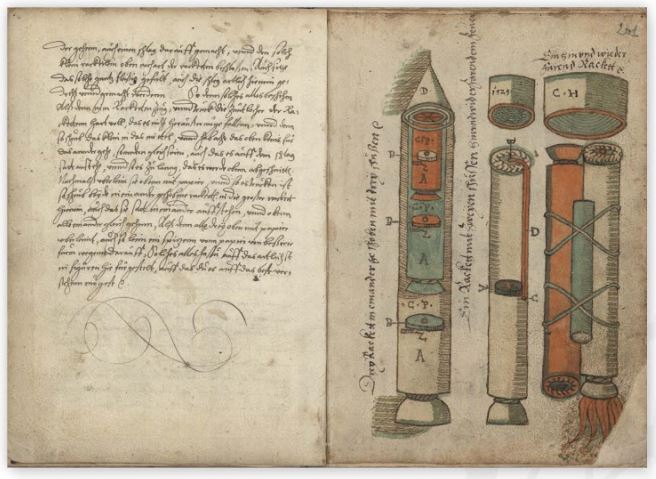Conrad Haas (1509-1576), a famous 16th century military engineer, was a pioneer of rocket propulsion and, indirectly, one of the earliest pioneers of space exploration. Born near Vienna in a village called Dornbach (today part of the XVII. district of Vienna), he entered the service of the Holy Roman Emperor Ferdinand I. and joined the imperial armed forces going to Transylvania in 1551 where he was appointed Arsenal Master in Sibiu (German: Hermannstadt).
In 1529 he began writing an ambitious and extraordinary innovative treatise on rocket technology. Using his knowledge of mathematics, chemistry, physics, ballistics and pyrotechnics, he produced a text which presents for the first time many concepts and designs that became established in modern rocket technology. He is thus one of the undisputed pioneers of modern missile and rocket engineering as his plans also include manned rockets.

The text is ambitious and original, a masterpiece in its genre, with 17 different types of rockets described. Haas was the first person to put into writing the concept of motion of multi-stage rockets, of different fuel mixtures using liquid fuel including brandy, delta-shaped fins for the flying machines and bell-shaped nozzles. Besides the calculations and written descriptions of these innovative technologies, Haas also provided colour illustrations in his manuscript to show the design of his devices and experiments.
Haas appears to have worked on this treatise for more than 25 years. The manuscript was completely unknown until its discovery in the State Archives of Sibiu in 1961. The work of Conrad Haas is part of a bigger volume together with two other manuscripts – the “Book of Fireworks” and the “Book of Military Techniques” – and consists of 282 pages.
Although war and battles played a crucial role in his life, Conrad Haas personally held a very pacifistic opinion as he stated at the end of his treatise: “But my advice is more peace and no war, the guns should be left under the roof, so the bullet is not shot, the powder is not burned wet, so the king keeps his money, the gunsmith his life; that is the advice of Conrad Haas.”
Karl Heinz, Scientific and Strategic Project Management
“European Digital Treasures”, ICARUS
